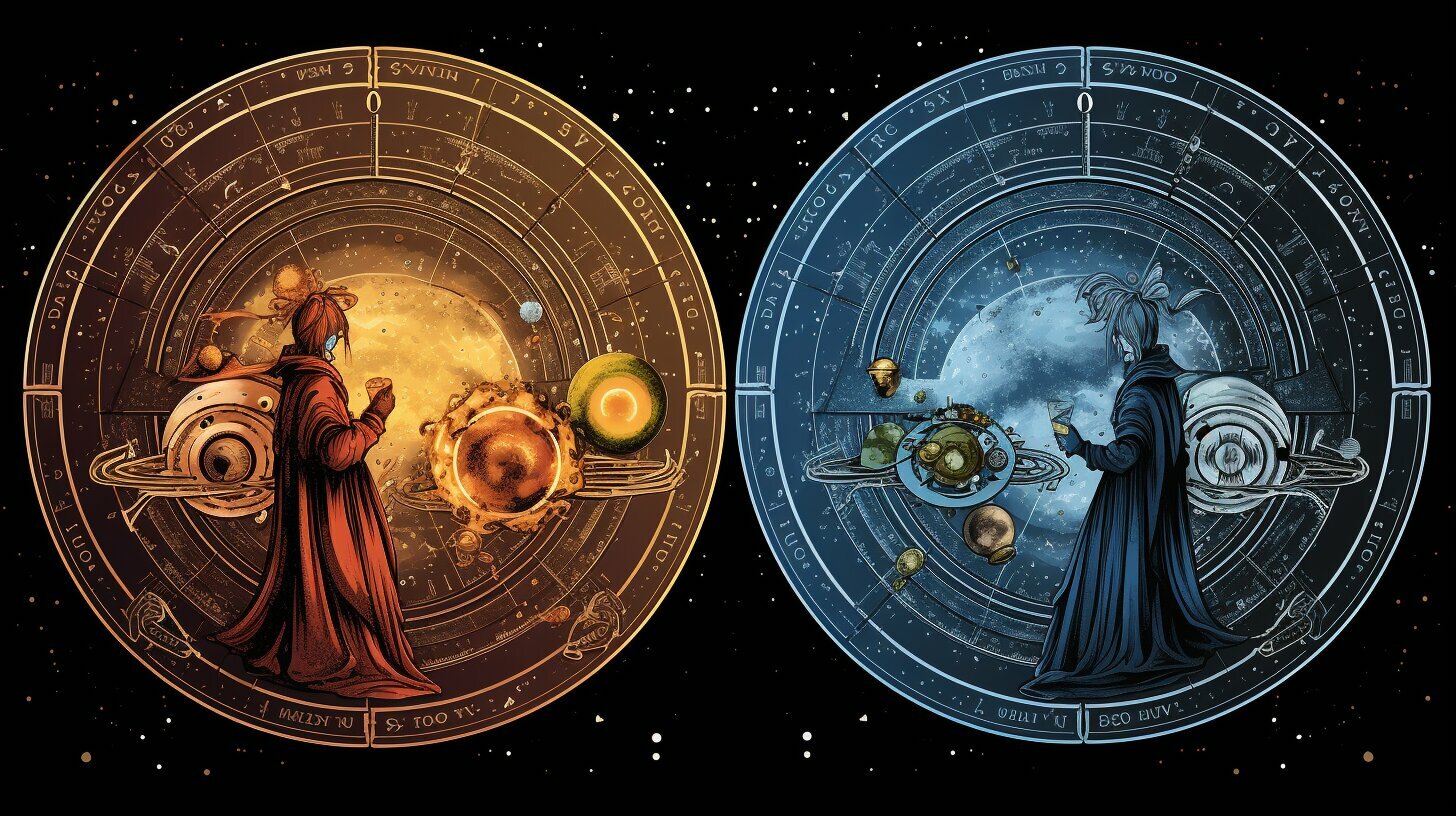I have always been fascinated by the universe and the diverse ways in which we study it. In this article, I will explore the differences and similarities between two professions that may seem similar but have distinct approaches and methodologies- astronomers and astrologers.
Astronomers and astrologers both study celestial objects such as stars and planets, but their motivations and methods are different. While astronomers use the scientific method and data analysis to understand the physical properties and behavior of celestial bodies, astrologers rely on subjective interpretations and beliefs to make predictions about human affairs and personality traits.
Key Takeaways
- Astronomers and astrologers both study celestial bodies, but their approaches and methodologies are different.
- Astronomy is a scientific discipline that involves empirical evidence and data analysis to understand the physical properties of celestial bodies.
- Astrology is a belief system that relies on subjective interpretations and positions of celestial bodies to make predictions about human affairs and personality traits.
- The debate between science and pseudoscience often arises when discussing the differences between astronomers and astrologers.
- Understanding the differences between these professions can help individuals make informed decisions about their own beliefs and pursuits.
What is an Astronomer?
As an astronomer, I have always been fascinated by the mysteries of the universe. Astronomy is the science of studying celestial objects such as stars, planets, and galaxies. Astronomy is an ancient science that has been around for thousands of years, and today, it is one of the most exciting and rapidly expanding fields of scientific inquiry.
Astronomers use a range of tools and techniques to study the properties and behavior of celestial objects. These include observations from ground-based telescopes, space-based telescopes, and other advanced technologies, as well as mathematical calculations and computer simulations. Through rigorous research and data analysis, astronomers seek to understand the physical processes that govern the behavior of celestial objects.
Careers in astronomy are diverse and can involve many different areas of research. Some astronomers specialize in studying specific types of celestial objects, such as stars or planets, while others focus on the development of new technologies and instruments for observational astronomy. Many astronomers work in academia or government research institutions, while others work in private industry.
One of the most exciting aspects of astronomy is the constant stream of new discoveries that are being made every day. From the discovery of new exoplanets to the detection of gravitational waves, astronomy is a field that is constantly pushing the boundaries of scientific knowledge.
If you are interested in pursuing a career in astronomy, there are many resources available to help you get started. Astronomy clubs and organizations offer educational programs and opportunities for hands-on experience, while universities and research institutions offer degree programs and research positions.
Whether you are a seasoned astronomer or simply curious about the fascinating world of the cosmos, there is always something new to learn and discover in the field of astronomy.
What is an Astrologer?
Now, let’s turn our attention to astrologers. Astrologers, as mentioned before, are individuals who interpret the positions and movements of celestial objects to make predictions and provide guidance about human affairs and personality traits. Astrology is often based on the belief that there is a connection between the positions of celestial bodies and events happening on Earth.
A career in astrology involves studying astrological charts, making predictions, and offering advice based on astrological principles. Astrologers may work independently or as part of a larger organization. Like astronomers, astrologers must have a deep understanding of celestial bodies, including the positions and movements of stars, planets, and other objects in the sky.
However, it is important to note that the beliefs and practices of astrology are not rooted in scientific evidence, and many in the scientific community view astrology as a pseudoscience. Nevertheless, astrology has a loyal following and continues to play a significant role in many individuals’ beliefs and personal lives.
Key Differences Between Astronomers and Astrologers
As I mentioned earlier, the main difference between astronomers and astrologers lies in their approaches and methodologies. Astronomers use the scientific method to study celestial bodies, relying on empirical evidence, data analysis, and peer-reviewed research to understand the universe. Astrologers, on the other hand, rely on subjective interpretations and beliefs that are considered pseudoscientific by the scientific community.
While astronomy is firmly rooted in scientific inquiry, astrology operates on subjective interpretations and lacks empirical evidence. Astronomers use telescopes and other advanced technologies to observe, measure, and analyze celestial bodies. They conduct experiments, collect data, and develop theories and models that can explain observed phenomena and predict future occurrences.
Astrologers, on the other hand, use astrological charts to interpret the positions and movements of celestial objects to make predictions and provide guidance about human affairs. Astrology is often based on the belief that there is a connection between the positions of celestial bodies and events happening on Earth. These beliefs are not based on empirical evidence, making astrology a pseudoscientific practice.
Another key difference between astronomers and astrologers is the level of acceptance among the scientific community. Astronomy is widely recognized as a scientific discipline, and the work of astronomers is subjected to rigorous peer review. In contrast, astrology is not accepted as a legitimate science and is often dismissed by the scientific community as a pseudoscience.
Understanding these key differences between astronomers and astrologers can help individuals make informed decisions about their own beliefs and pursuits. While both professions involve the study of celestial bodies, the approaches and methodologies used by astronomers and astrologers are fundamentally different.
Similarities Between Astronomers and Astrologers
Despite the stark differences between astronomers and astrologers, they do share some common ground. Both fields involve studying celestial bodies and their influence on the world. Additionally, astronomers and astrologers use the positions and movements of celestial objects as their foundation for analysis, albeit with different intentions and interpretations.
For example, astronomers and astrologers both observe the cycles of the moon. Astronomers study the moon’s physical properties, such as its composition, orbit, and gravitational effects on Earth. Astrologers, on the other hand, use the moon’s position to make predictions about human emotions and behavior.
Another similarity between astronomers and astrologers lies in their use of data analysis techniques. While astronomers use mathematical calculations and advanced technology to analyze their observations, astrologers also rely on complex algorithms and methods to interpret astrological charts.
Despite these similarities, it is important to remember the fundamental differences between astronomers and astrologers. While astronomy revolves around empirical evidence and scientific inquiry, astrology relies on subjective interpretations and lacks empirical evidence to support its claims.
Further Reading
- The Difference Between Astronomy and Astrology by The Scientific Psychic
- Astronomy vs Astrology: What’s the Difference? by Space Place NASA
The Significance of Astronomy in Advancing Scientific Knowledge
As an astronomer, I am particularly aware of the crucial role that astronomy has played in advancing our scientific knowledge and understanding of the cosmos. Through rigorous application of the scientific method, we have been able to make groundbreaking discoveries that have shifted our conception of the universe.
Astronomy involves numerous approaches, including the study of celestial objects such as stars, planets, and galaxies, but also encompasses the use of observations, mathematical calculations, and advanced technology to explore the physical properties and behavior of these celestial bodies. By using empirical evidence, data analysis, and peer-reviewed research, astronomers have been able to contribute to the development of theories and laws that govern the behavior of celestial bodies.
| Example of Astronomical Discoveries | Related Fields of Research |
|---|---|
| Discovery of exoplanets | Planetary science and astrobiology |
| Expansion of the universe | Cosmology and gravitational physics |
| Nature of black holes | Astrophysics and general relativity |
It is through astronomy that we have gained invaluable insights into the nature and origin of the universe. It is fascinating to consider how much we have learned about our world and beyond, and how much more we have yet to discover.
Furthermore, the scientific nature of astronomy emphasizes the importance of distinguishing between evidence-based knowledge and belief systems, which is in stark contrast to the field of astrology.
The Significance of Astronomy in Advancing Scientific Knowledge
As an astronomer, I am particularly aware of the crucial role that astronomy has played in advancing our scientific knowledge and understanding of the cosmos. Through rigorous application of the scientific method, we have been able to make groundbreaking discoveries that have shifted our conception of the universe.
The Role of Astrology in Human Beliefs and Culture
Now, let’s explore the fascinating world of astrology and its impact on human beliefs and culture. Despite being considered pseudoscience, astrology has had a significant influence on individuals and societies throughout history.
“Astrology is a language. If you understand this language, the sky speaks to you.” – Dane Rudhyar
Many individuals turn to astrologers to gain insights into their personalities, relationships, and future events. Astrology provides a framework for understanding the world and one’s place in it. As a result, it has influenced the arts, literature, and even political decision-making in some societies.
| Astrology Beliefs | Astronomer vs. Astrologer |
|---|---|
| Astrology is based on the belief that the positions and movements of celestial bodies can provide insights into human affairs and personality traits. | While astronomers use empirical evidence, data analysis, and peer-reviewed research to understand the universe, astrologers rely on subjective interpretations and beliefs. |
Despite the stark contrast between these two professions, astrology has played a significant role in shaping human beliefs and culture. By recognizing the differences and similarities between astronomers and astrologers, we can appreciate the complexity and diversity of human knowledge and pursuits.
The Debate: Science vs. Pseudoscience
One of the most significant differences between astronomers and astrologers is the approach and methodology that they follow. As I mentioned earlier, astronomy is firmly rooted in scientific inquiry, relying on empirical evidence, data analysis, and peer-reviewed research to understand the cosmos. Astrology, however, operates on subjective interpretations and beliefs that lack empirical evidence, making it a pseudoscience in the eyes of the scientific community.
While astronomy follows strict standards of scientific inquiry, astrology often fails to meet these rigorous standards, leading to debates about its validity and accuracy. Scientific inquiry is based on evidence and logical reasoning, whereas pseudoscience relies on statements and beliefs that cannot be tested or verified.
The debate between science and pseudoscience highlights the importance of critical thinking and the scientific method. It also underscores the need for distinguishing between evidence-based knowledge and belief systems. While astrology may provide comfort and guidance for many individuals, it should not be used as a scientific tool for predicting or understanding human behavior or events.
The Future of Astronomy and Astrology
As an astronomy enthusiast, I can’t help but be excited about the future of this field. With advancements in technology, astronomers can now explore the universe in greater detail, uncovering new discoveries and expanding our understanding of the cosmos. In fact, the demand for astronomers is expected to grow by 7% over the next decade, providing many opportunities for those interested in pursuing a career in astronomy.
Similarly, astrology continues to have a dedicated following, with individuals seeking astrological guidance and incorporating it into their daily lives. While astrology may not be based on empirical evidence, it still plays a significant role in shaping human beliefs and culture. As such, there will likely continue to be demand for astrologers and those interested in pursuing a career in astrology.
Whether you’re drawn to the scientific inquiry of astronomy or the spiritual guidance of astrology, there are many opportunities to explore the cosmos and contribute to our understanding of the universe. So, whether you choose to pursue a career in astronomy or astrology, I wish you all the best on your journey of exploration and discovery.
Reflecting on the Astronomer vs Astrologer Comparison
After delving into the differences and similarities between astronomers and astrologers, it is clear that these two professions offer distinctly contrasting approaches to understanding the cosmos. While astronomers rely on empirical evidence and rigorous scientific inquiry to uncover new knowledge, astrologers interpret celestial movements and positions to provide guidance and predictions based on subjective beliefs.
Understanding the differences between these professions is vital in appreciating the role of evidence-based science in our understanding of the world while respecting the diverse beliefs and practices that shape our culture. It is essential to recognize the importance of critical thinking and the scientific method in assessing the validity of information.
It is evident that astronomy has made significant contributions to scientific knowledge, leading to groundbreaking discoveries and the development of theories that shape our understanding of the universe. At the same time, astrology continues to have a devoted following, with individuals turning to astrologers for guidance and comfort based on personal beliefs.
As the future unfolds, both astronomy and astrology are likely to evolve continuously. Advancements in technology will allow astronomers to explore the cosmos in greater detail, while astrologers continue to provide guidance and insight to those who seek it. By recognizing the differences between these professions, we can make informed decisions about our beliefs and pursuits.
Ultimately, whether we choose to align ourselves with the scientific community or seek guidance from astrological principles, understanding the distinct approaches of astronomers and astrologers can help us navigate our world with a greater sense of clarity and appreciation for diverse perspectives.
Reflecting on the Astronomer vs Astrologer Comparison
As I have explored the differences and similarities between astronomers and astrologers, I am struck by the contrast between the scientific and pseudoscientific approaches to understanding the universe. Astronomy is firmly rooted in the scientific method, relying on empirical evidence, data analysis, and peer-reviewed research to gain insights about the cosmos, while astrology relies on subjective interpretations and beliefs that lack scientific evidence.
It is essential to acknowledge these differences and recognize the significance of evidence-based knowledge in advancing scientific research. At the same time, it is crucial to respect the diverse beliefs and practices that contribute to the richness of human culture. For many individuals, astrology provides comfort, guidance and serves as an integral part of their beliefs and decision-making.
As we look to the future, both astronomy and astrology will continue to evolve and contribute to our understanding of the cosmos. Advancements in technology allow astronomers to explore the universe in greater detail, uncovering new discoveries and expanding our knowledge of the cosmos. Similarly, astrology continues to have a dedicated following, with individuals seeking astrological guidance and incorporating it into their lives.
In conclusion, the comparison between astronomers and astrologers highlights the distinct methodologies, beliefs, and contributions of each profession. While astronomy is firmly rooted in scientific inquiry, astrology operates on subjective interpretations and beliefs. Both fields, however, have left a lasting impact on human culture and our understanding of the cosmos. By recognizing these differences, we can appreciate the role of evidence-based science and respect the diverse beliefs and practices that shape our world.
FAQ
Q: What is an astronomer?
A: Astronomers are scientists who study celestial objects such as stars, planets, and galaxies. They use observations, mathematical calculations, and advanced technology to explore the physical properties and behavior of these celestial bodies.
Q: What is an astrologer?
A: Astrologers interpret the positions and movements of celestial objects to make predictions and provide guidance about human affairs and personality traits. Astrology is often based on the belief that there is a connection between the positions of celestial bodies and events happening on Earth.
Q: What are the key differences between astronomers and astrologers?
A: The main difference lies in their approaches and methodologies. Astronomers use the scientific method, relying on empirical evidence and data analysis. Astrologers, on the other hand, rely on subjective interpretations and beliefs that are considered pseudoscientific by the scientific community.
Q: Are there any similarities between astronomers and astrologers?
A: Despite their differences, both professions involve studying celestial bodies and their influence on the world. Additionally, both astronomers and astrologers rely on the positions and movements of celestial objects as their foundation for analysis, albeit with different intentions and interpretations.
Q: What is the significance of astronomy in advancing scientific knowledge?
A: Astronomy has played a crucial role in advancing our scientific knowledge and understanding of the cosmos. Astronomers have made groundbreaking discoveries, such as the existence of exoplanets, the expansion of the universe, and the nature of black holes.
Q: What is the role of astrology in human beliefs and culture?
A: Astrology, despite being considered pseudoscience, has had a significant impact on human beliefs and culture throughout history. Many individuals have found comfort and guidance in astrology, turning to astrologers for insights into their personalities, relationships, and future events.
Q: What is the debate between science and pseudoscience?
A: The debate between science and pseudoscience often arises when discussing the differences between astronomers and astrologers. Astronomy follows the rigorous standards of scientific inquiry, while astrology relies on subjective interpretations and lacks empirical evidence.
Q: What does the future hold for astronomy and astrology?
A: Advancements in technology allow astronomers to explore the universe in greater detail, uncovering new discoveries and expanding our understanding of the cosmos. Similarly, astrology continues to have a dedicated following, with individuals seeking astrological guidance and incorporating it into their lives.
Q: What can we learn from the comparison between astronomers and astrologers?
A: The comparison highlights the contrasting approaches to understanding celestial bodies and their influence. While astronomers contribute to scientific knowledge through research and observation, astrologers provide interpretations and guidance based on subjective beliefs.
Q: What is the conclusion of the astronomer vs. astrologer comparison?
A: The comparison reveals the distinct methodologies, beliefs, and contributions of each profession. While astronomy is firmly rooted in scientific inquiry, astrology operates on subjective interpretations and beliefs. Both fields, however, have left a lasting impact on human culture and our understanding of the cosmos.
- Unveiling the Truth: Are Scorpio and Pisces Soulmates? - January 13, 2024
- Understanding What a Pisces Man Dislikes in a Woman - January 12, 2024
- Unveiling Artists with Pisces Moon: Astrology Meets Artistry - January 11, 2024



